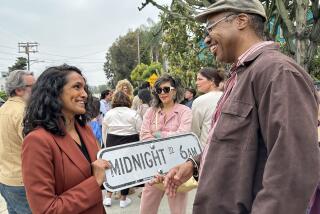Anti-Gay Measure Stirs Jitters : Tourism: Some Oregon officials fear that passage of the initiative could cost the state millions of dollars in lost travel and convention business.
- Share via
SALEM, Ore. — Gus Van Sant is shooting his latest movie, “Even Cowgirls Get the Blues,” in Oregon. But he isn’t sure he’ll be filming any movies in his home state after November.
“It’s not whether I want to. It’s whether I legally could,” the Portland-based director said.
Van Sant, who is gay, is worried about a measure on Oregon’s Nov. 3 ballot that would label homosexuality abnormal and forbid government from promoting or facilitating it.
“It might get to the point where people like me can’t shoot their films,” said Van Sant. His last movie, “My Own Private Idaho,” dealt with male prostitutes.
Measure 9 also is causing jitters among the people who promote Oregon’s travel and convention business. They fear that tourists and professional groups will shun Oregon, costing the state millions.
“I think the potential for that is there,” said Jim Bocci of the Portland-Oregon Visitors Assn. “This thing has gotten quite a bit of national attention.”
Bocci noted that Arizona lost more than $160 million in convention business after dropping a state holiday honoring Martin Luther King Jr.
One of the chief supporters of Measure 9 accuses opponents of trying to blackmail Oregon voters with empty threats of economic disaster.
“The homosexual community potentially could be creating a self-fulfilling prophecy that could hurt some businesses in the state,” said Lon Mabon, chairman of the Oregon Citizens Alliance. “But long-term, it’s going to have no effect at all.”
The economic argument against Measure 9 has become a focus of efforts to defeat the ballot plan this fall.
Gov. Barbara Roberts, who calls Measure 9 a cancer on Oregon’s soul, urges people to reject it as a matter of conscience. But she also tells them that rejecting it is in their financial interest.
She says one of the first casualties of the measure could be Oregon’s growing popularity with Hollywood movie producers.
A record 15 feature-length or made-for-TV movies have been filmed so far this year in Oregon, putting about $60 million into circulation in the state, the Oregon Film and Video Office says.
But Van Sant said Measure 9 is so broadly worded that a government agency could refuse to issue business permits for a movie that deals in any way with homosexuality, such as his current film, which contains a romantic relationship between two women.
Van Sant said he didn’t know if Hollywood would boycott Oregon. “But I think it would give us a poor image that might affect people coming here,” he said.
Convention and tourism officials say they have already heard from several groups considering canceling gatherings in Oregon to protest Measure 9.
The National Middle School Assn. is threatening to take its November, 1993, convention out of Portland, Bocci said. The event is expected to draw about 4,200 people and put about $2 million into the economy.
“They said they feel uncomfortable with the atmosphere that the ballot measure would generate in Oregon,” Bocci said. “They said it promotes discrimination.”
Earlier this year, Springfield voters approved a City Charter amendment similar to Measure 9. Since then, officials in Springfield’s Chamber of Commerce say they have received dozens of letters from people outside the state who said the amendment had caused them to cancel plans to visit Oregon.
Steven Petersen, director of the Oregon Department of Economic Development, said it is difficult to predict Measure 9’s financial effect.
More to Read
Sign up for Essential California
The most important California stories and recommendations in your inbox every morning.
You may occasionally receive promotional content from the Los Angeles Times.













